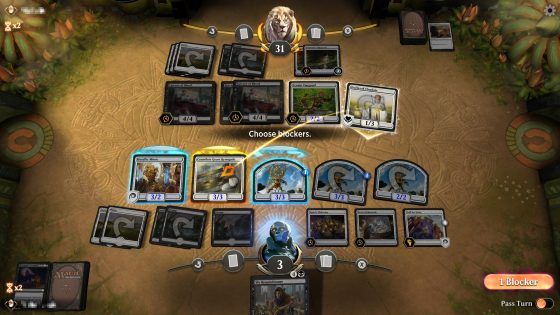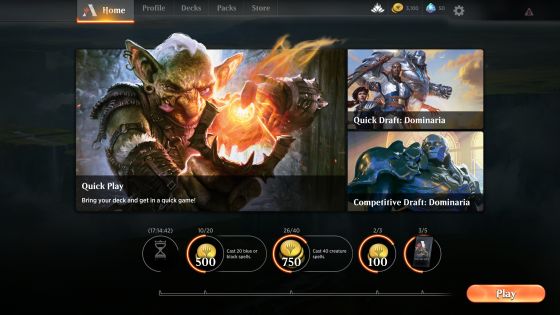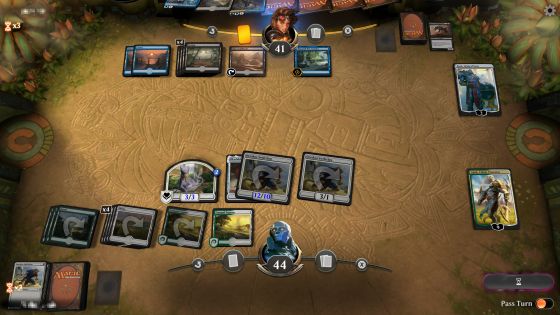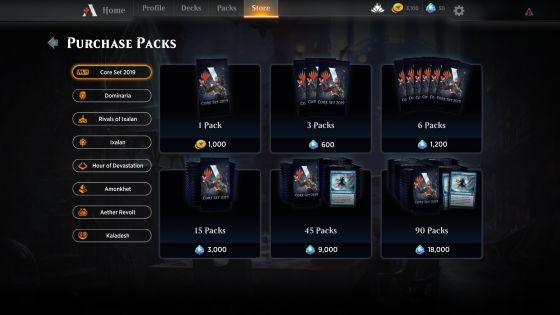My first hand leaves me awash among a handful of islands, but I find the unrelenting water to be ill-suited for the tools I have on-hand. I discard the sea of unhelpful symbols and draw a smaller hand. I find it gives me exactly the same as the last, but with fewer tools. I swallow the concern, accept the hand, and hope the fates deal me new opportunities as my deck grows thinner, one card at a time. Sat opposite the face of a planeswalker, I place an island on the stone table in front of me, and pass my turn.
There is something kind of hauntingly familiar about this place. As if one is playing cards on a carved table deeply buried in an ancient temple, helmed by gods whose names time has forgotten and modern tongues likely couldn’t pronounce. It feels like a dramatic scene in an old movie, even though the only conflict in these walls are what happens on the cards, it feels as though something big is around the next drawn card, or the next desperate combat phase.
I find myself sitting here, praying for the card that will save my life, or the near certainty of the several others that will inadvertently end it.

Gameplay - 9/10
Magic the Gathering is a collectible trading card game published by Wizards of the Coast that has been around since the early 90s. In its basic format, in brief, players buy booster packs, collections, and individual cards to assemble a deck of creatures, spells, and enchantments to defeat opponents using cards on hand. Decks are assembled, constructed, and used to combat other players’ decks.
Magic the Gathering Arena allows this basic premise and several other common formats, as its basic gameplay interaction. Players can pick from cards currently in standard, including which types and how many of lands, and build decks. These decks can vary in size, depending on the formats they’re being built for, and submitted in order to participate in timed events.
It’s hard to say much about Magic the Gathering Arena that isn’t just “It’s Magic the Gathering.” The user interface and experience are fairly intuitive, as is the tutorial that teaches players the basics of the game on first sign-in. Games tend to go fairly quickly regardless of format, and excepting occasional bugs in the interface, there’s nothing between the player and the game. Visual effects are fairly quick, the important parts of cards mirror their real-world counterparts but also have unique colors when they’re modified by damage or card effects, and card effects are displayed on mouseover, complete with an explanation of various keyword effects.
In brief, Magic the Gathering Arena is a well-dressed Magic the Gathering vehicle.
Innovation - 7/10
It’s difficult to really discuss how innovative Magic the Gathering Arena is because of the above. Anyone who’s played existing Magic or other digital trading card games knows how it works. Select if the hand works, gather energy, summon creatures, cast spells, win fights. The formula is familiar, simple, and effective.
If anything, most of the meat of innovation relies on the variety of formats Arena offers. Players can enter events cycle every few days, with each of the formats affecting play in different ways: no card multiples, players begin with more life, drafts, etc. These variations on format give the players the ability to break from repeating quick match and ranked games and break out of a single pattern of play. For Magic fans in particular, the rotating format can bring interesting surprises and fun formats to both build for and play in.

That said, Magic the Gathering Arena is still a trading and collecting card game, so those going into it will likely be existing fans of the genre, and those not among that audience will likely find little else other than more cards and decklists.
Learning Curve - 6/10
Magic the Gathering is a well-loved game and it has both long and wide pools of professional players, skilled enthusiasts, hobbyists, fans, detractors, and streamers. It means that any given opponent in MtGA may very well be an exceptional player who understands how to apply their cards effectively, which hands are best to keep or mulligan, and has assembled efficient decks with solid combinations and good synergy throughout. Even those who aren’t master deck craftsmen, deck lists for major tournaments and guide videos come out with constant regularity, which means players of all stripes have access to building and using exceptional decks with tips on how to play these decks built-in.
For players first getting their feet wet, it means MtGA is a genuinely difficult game to wade into. Without the ability to communicate outside of a handful of select phrases—”Hello,” “Good game,” “Nice,” etc.—playing can often feel like an avalanche of confusing losses and silent domination. Mulligans, inexpert plays, losses, pivotal cards being counterspelled, losses, and planeswalkers getting killed before they can really come into their own. And losses.
That said, the side effect of all of the above is that players who do want to commit to playing well have the very same guides, explanations, decklists, and opportunities to learn tips toward high-level play, often directly from high-level players. In short, there are opportunities to learn at hand. Those who want a casual card game likely won’t find it here, but the opportunity to learn is baked into Magic being an already popular game.

Graphics / Sound - 8/10
Magic the Gathering Arena is a reasonably pretty game. The visual effects are sharp and crisp, relevant keywords and card effects are made visible and present. Neat flourishes like floating cards, lines of attack, cards sliding toward their targets, and all sorts of other neat tidbits are present across the experience. Card attacks sound meaty as they impact one another or other players, card effects make pleasant chimes as the effects take hold. Scorpions scuttle at the edges of the table, firelight flickers, and the atmosphere inside the room feels cool and distant.
Perhaps one of the neatest features is in deck building, which provides little customizations such as selecting card art for the deck box and custom titles for the various decks. It feels exceedingly pleasing to have these little touches available and easily accessed.
In fact, many of the graphics and sounds in Arena seem to stick the landing in pleasant touches.
Value for Money - 7/10
The real fly in the soup for Arena lands in the hand hovering over the wallet.

Players can earn coins for accomplishing various little goals like playing certain amounts of mana or casting spells of a certain color. These coins can be spent on buying booster packs, or taking part in the non-Quick Play formats. Over regular play, a player can expect to unlock enough coins for a booster or two per play session, and perhaps enough for a draft or the unique format every game or three.
Everything else, including buying multiple boosters or joining ranked Drafts, involves gems. Like with collecting physical Magic the Gathering cards, it feels like those who are willing to buy boosters and spend lots of money and time optimizing their decks will always have the advantage. Likewise, those who want to take part in Ranked Drafts will find gems are the only currency that matters.
But those who are okay with a semi-casual Magic the Gathering experience will probably find Arena easy on the wallet. Just with the caveat that players who pay will always, inevitably, have more.
Final Score - 8 / 10
Magic the Gathering Arena is mostly Magic the Gathering. If that works for you, you’ll find plenty to like here.
Pros
Visually pleasing experience for those seeking a digital Magic the Gathering format.
Game offers multiple play formats and the built-in deck builder is robust and friendly.
Play itself is familiar and similar enough to handling physical cards that those familiar with Magic can sink right in with minimal learning curve.
Cons
Limited communication can make playing feel kind of remote and isolated.
Gems are the lifeblood that make great decks possible.
Magic the Gathering is a game full of skilled enthusiasts, Arena is a game that’s composed almost entirely of those skilled enthusiasts.